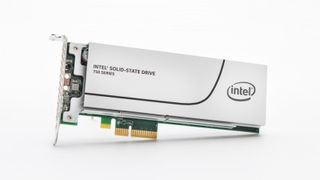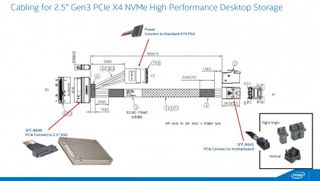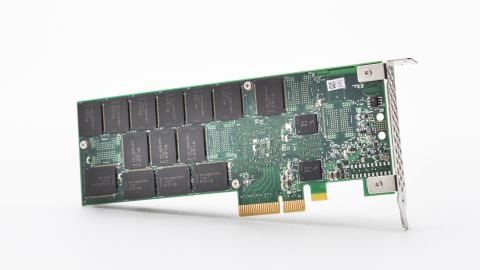Why you can trust TechRadar
The difference between the NVMe and AHCI protocols were ably illustrated when Intel introduced its enterprise level DC P3700 NVMe drive, the predecessor to the Intel SSD 750 1.2TB.
There it used the Linux AHCI stack as an example of the wasted time and power that goes into running an SSD across the legacy protocol.
Using a quad-core i5, the Linux stack runs to 27,000 CPU cycles, which means it needs a full ten Sandy Bridge-level cores to drive one million IOPS (input/ouput operations per second). With the streamlined NVMe Linux stack that's cut by around a third, it only needs 10,000 CPU cycles to get to the magic million figure.
This is because the new protocol has been designed specifically for NAND Flash storage and this low-latency access now means SSDs are capable of standing on their own without needing any old tech from the mechanical days of storage.
The slate has been wiped clean and we can kick on from here getting at the true speed of SSDs.
And that enterprise P3700 drive is important, not just for providing an example of how powerful the NVMe protocol can be, as it forms the basis of this Intel SSD 750 Series, the first consumer NVMe drive.

The bespoke Intel NVMe controller at the heart of the P3700 is the same 18-channel controller as the one that makes the Intel SSD 750 so darned speedy. That controller is kept honest with a hefty 2GB of DDR3 cache on this 1.2TB version.
The storage part of the equation is made up of eighty-six 128Gb NAND modules, arrayed over thirty-two separate die packages on the PCIe board.
The memory chips themselves are Intel's own 20nm MLC design. We are guessing they're 16GB modules, which would mean there's a hefty amount of over-provisioning going on inside this drive. This may be a result of its enterprise heritage, and that sector's demand for multiple redundancies.
Whatever the actual make up of the drive though there's no disputing the fact it's blazing fast.
It's also a remarkably simple drive to use too. Drop it into a waiting Gen 3 PCIe slot and watch it go.
There are certain caveats though - it needs to be at least a x4 lane slot, and it needs to be connected directly to the CPU rather than the PCH. It also needs the full bandwidth of a PCIe 3.0 slot to give the SSD 750 a chance to really stretch its NVMe legs.
Plug it into the PCH and you'll only get around half the performance.
It's also only available on Z97 and X99 boards for now.
Intel has said it would be compatible with both Z77 and Z87 chipsets, but because NVMe needs BIOS investment mobo makers are no longer spending on legacy chipsets, so it was simpler to go straight for the latest boards. Intel has been working hard over the last 6-12 months to ensure the BIOS manufacturers had the support to get things in place for launch.
That's why you'll have seen the likes of MSI and ASRock crowing about NVMe support despite a conspicuous lack of actual product to connect to their boards.
This PCIe version is fully bootable - once our Asus Maximus VII Hero board had its latest BIOS in place, it instantly saw the SSD 750, gave us the option to install our OS and boot away. Setting up the OS was a doddle too, though Microsoft's NVMe driver needed replacing with Intel's latest driver to get top speed.
There is also an Intel SSD 750 Series 400GB edition too, designed in a 2.5-inch form factor. Intel has created this for the burgeoning small form factor community who can't afford the space for a PCIe GPU as well as a PCIe SSD.
The issue with that drive though is the connection.

Intel is using an SFF-8639 connection on the drive itself, powered by a connected SATA power cable, to connect to the motherboard. The mobo makers will need to start putting SAS-based SFF-8643 sockets on their boards to accommodate the new cable from the 2.5-inch Intel SSD 750 400GB.
Intel has though said it will be producing an M.2 adapter which should alleviate some of the potential connection problems and allow it to work with existing smaller Z97 or X99 motherboards.
Current page: Technology and architecture
Prev Page Introduction Next Page Performance and benchmarks
An incredible $100 billion bet to get rid of Nvidia dependence — tech experts reckon Microsoft will build a million-server strong data center that will primarily use critical inhouse components

The real total eclipse was better than the pics I shot with my iPhone 15 Pro Max and DSLR, and believe me I tried

Quordle today – hints and answers for Sunday, April 14 (game #811)
